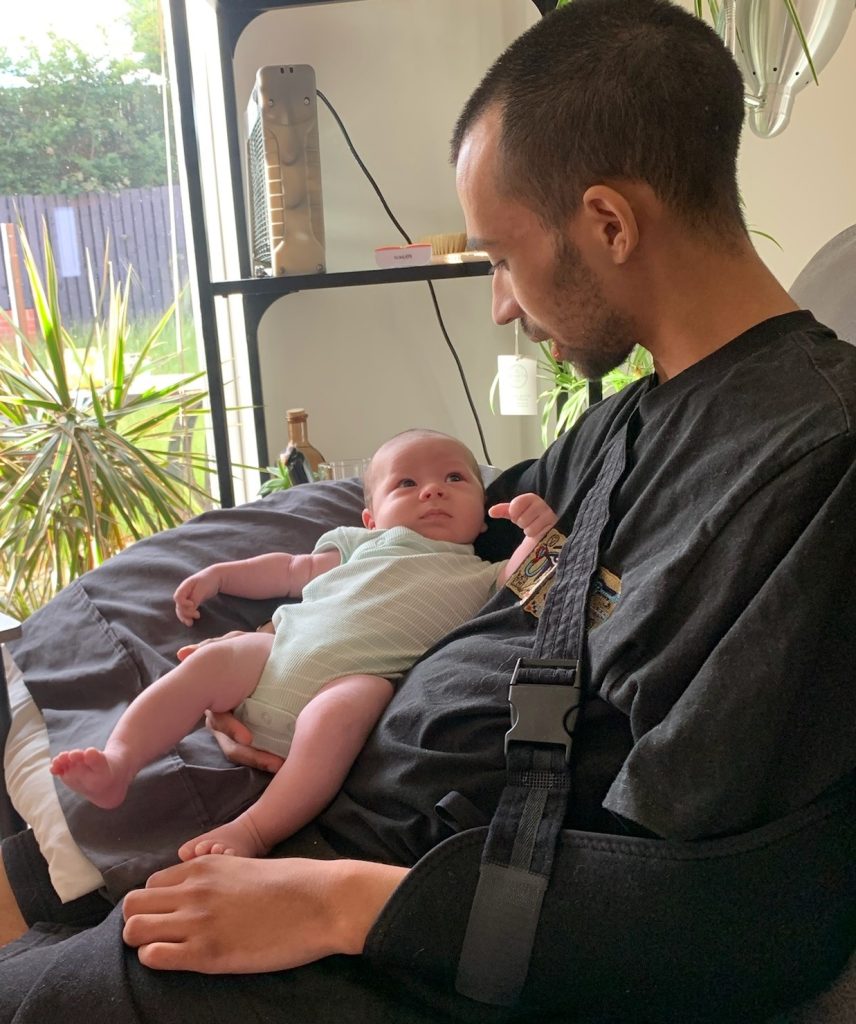A Durham man who took part in a new clinical trial after suffering a major stroke has been reunited with his family in time to attend the birth of his baby.
Harrison Kingsley, 28, started feeling unwell with developed left sided weakness. Harrison had suffered an ischemic stroke, which happens when the blood flow through the blood vessels supplying the brain is blocked by a clot and oxygen cannot reach the brain.
Harrison was transferred to the RVI for treatment to remove the blood clot from the brain, but he was too poorly to undergo the surgery.
While on the ward, Dr Anand Dixit, consultant stroke physician at Newcastle Hospitals, explained that treatment options were limited, but told Harrison about a new clinical trial which aims to determine if a stem cell infusion can improve recovery from a stroke.
Stem cells have the unique ability to develop into cells in the body with specific functions, such as blood cells. Research has shown that stem cells can repair damaged tissue in the brain and calm down inflammation caused by a stroke.

Harrison, who was the first patient in Europe to take part in the trial, said:
“I couldn’t believe it when doctors said I had suffered a stroke. I’m only 28 and the thought of not being around to see my child grow up and be with my family was absolutely heart-breaking.
“This clinical trial has given me hope for the future and I am incredibly grateful to Dr Dixit and his team for giving me the opportunity to take part.
“I wouldn’t think twice about taking part in research again. If it wasn’t for the care I received at the RVI, I don’t know if I would be here today talking about my experience.”
Due to the nature of the trial, it’s not known whether Harrison has received the stem cell infusion or a ‘dummy’ version, known as a placebo, however his recovery to date has been remarkable.
Dr Dixit said:
“Unfortunately, treatment options for ischemic strokes are very limited, so clinical trials are vital if we are to find new ways of treating them.
“Harrison’s recovery is incredible to see and, while we don’t know for certain that he has received the infusion, we are cautiously optimistic that the treatment shows promise for stroke patients.
“The Newcastle stroke team is the only unit in the country to have participated in this trial, from its early stages through to this current, larger trial. I would like to extend my thanks to everyone involved in making this possible.
“We are very excited to see what the future brings for Harrison as he continues on this trial with our team.”
Dr. Robert W. Mays, Executive Vice President and Head of Regenerative Medicine and Neurology Programs at study sponsor, Athersys, said:
“Current treatments for stroke are limited by a constrained time window for administration after a stroke. We believe that MultiStem cell therapy has the potential to improve standard of care for patients who have suffered a debilitating stroke and can also meaningfully extend the treatment window up to 36 hours after the stroke, providing a potential treatment option for many more patients.
“The MASTERS-2 trial is a robustly designed clinical trial to evaluate the potential of this important technology. We are thankful for patients like Harrison who are willing to participate in clinical trials to advance science and be a part of the future of medicine. We also would like to thank Dr. Dixit and his entire team at The Newcastle upon Tyne Hospitals NHS Foundation Trust for participating in this important study.”
The study is supported by the National Institute for Health and Care Research (NIHR), the research partner of the NHS, public health and social care.
